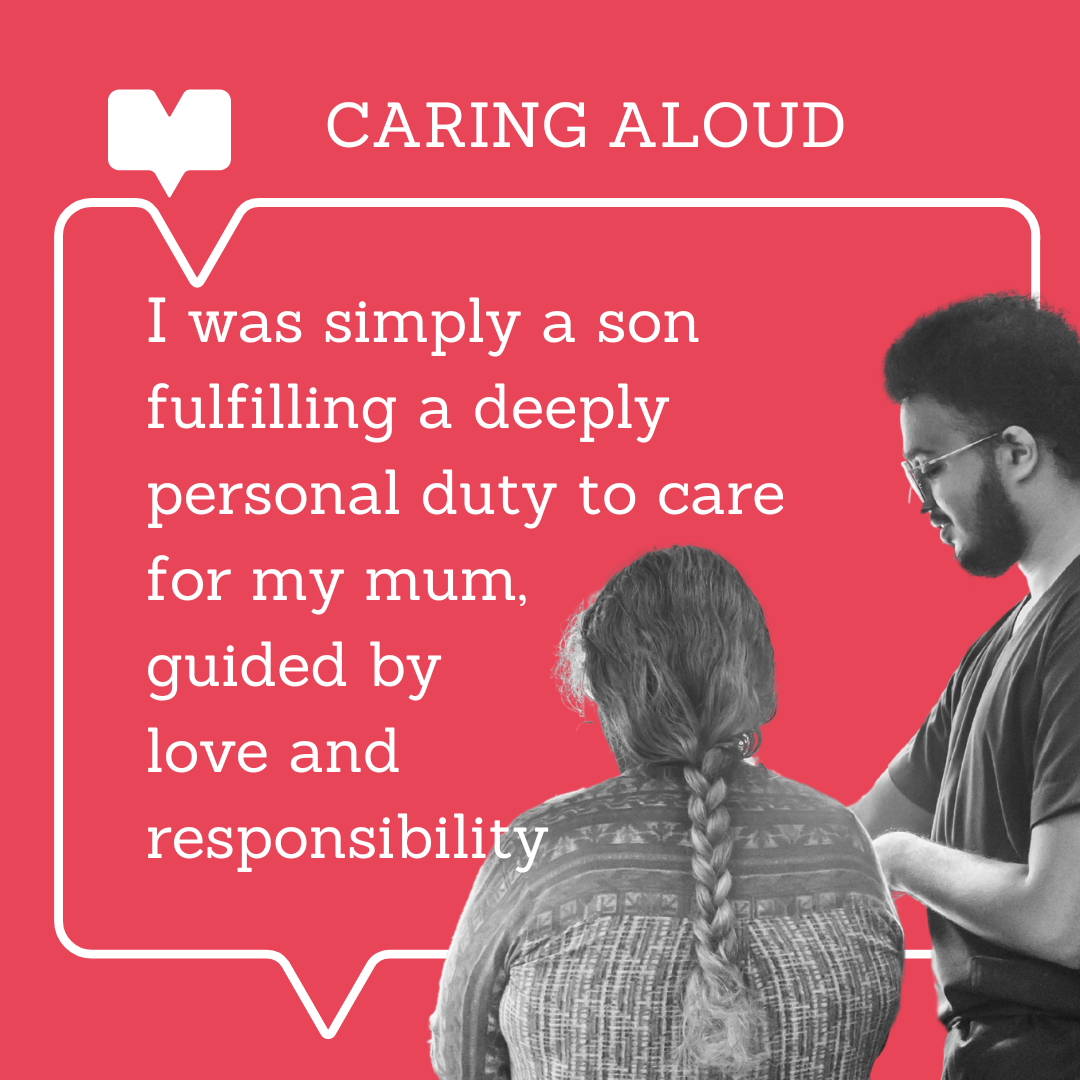Caring Aloud – Matthew’s Story
Published: 9 Apr 2025

For the next in our Caring Aloud series, Matthew* shares his experience of looking after his mother, whilst also caring for his children, known as ‘sandwich caring’. There are an estimated 1.3 million people in the UK caring for two generations, and numbers are set to rise due to our aging population. With 1 in 4 sandwich carers feeling the strain on their mental health, flexibility has a crucial role to play in helping carers manage, as Matthew explains.
For the last eight years of her life, I had the profound privilege of being my mother’s primary carer.
During this time, I never truly considered myself a carer or explored what support might be available. To me, I was simply a son fulfilling a deeply personal duty to care for my mum, guided by love and responsibility rather than any formal label.
Caring for my mother didn’t feel like juggling responsibilities, it simply became an additional responsibility. In relation to my mother, our roles had reversed. Caring for my mother became equally important and time consuming as parenting my children. They all had doctors appointments and activity schedules which needed facilitating. As things unfolded in real time, I didn’t really stop and take time to think about how I was going to manage all this, I just got on with it as best as I could.
I’ve always felt fortunate to have a level of flexibility at work, especially when it came to being a parent. In terms of being open about my role as my mother’s primary carer, I don’t think I even formally informed my employer—I simply leaned on the same understanding and flexibility I’d already been given. I did share my situation with a few close family members and friends, but I’m naturally a private person and not one to broadcast details about my personal life.
Although I’ve benefited from flexible working which has helped manage my caring responsibilities, I never allowed myself to be completely disconnected. I always had my laptop with me while caring for my mother. Often, I’d find myself taking conference calls or juggling tasks, seamlessly blending work and caregiving as best I could.
I’m deeply aware that not everyone has the same level of flexibility from their employer that I was fortunate to have. It’s something I feel passionately about—seeing flexible working championed in workplaces, with a broader understanding that caregiving responsibilities extend far beyond just raising children. Recognising and supporting all forms of care can make a world of difference for so many.
My personality type leans towards privacy, but I recognise that a culture shift is necessary to support others who want to be more open about being a carer. I also recognise that I enjoyed the privilege of flexibility at my workplace, and if I hadn’t had that I may have had to be more vocal in explaining my situation and saying what my flexibility needs were.
I never really felt entitled to any support for myself, but what I valued most was the network I was able to establish for my mother. It was this network—comprised of carers, cleaners, nurses, doctors, social services, and support from the local authority—that ensured her round-the-clock needs were met. I knew I couldn’t be there 24/7, but having such a reliable and compassionate team in place gave me immense peace of mind.
For several years, I carried the responsibility of being a carer selflessly, with little to no support from my siblings—a reality that has left a lasting mark on those relationships. Despite this, I take great pride in the personal growth I experienced during that time. The journey strengthened my perseverance and resilience in ways I never could have imagined, and for that, I am deeply grateful.
Reflecting on my time as a carer, I believe there’s a need for a smoother, more supportive process for primary carers navigating local authority matters for the elderly. My own experiences were far from seamless. Interactions often felt unnecessarily complicated and, instead of easing the burden during challenging times, they frequently added to the stress. Addressing this inefficiency is one of the significant challenges I think carers like myself face.
*Names have been changed

Caring Aloud – Margaret & Iwan
For the first in our Caring Aloud series we spoke with Margaret, who is a member of our Parent and Carer Advisory Panel. She talks openly about the challenges of being a carer and navigating work, as well as the unexpected joy her role has brought.

Caring Aloud – Adrian’s Story
In the next in our Caring Aloud series, we hear from Adrian, who talks candidly about the challenges of running your own business whilst caring, and his frustration at the lack of support for self-employed carers.

Caring Aloud – Andrew & Joanne
In the next in the Caring Aloud series, we hear from Andrew, one of our Parent and Carer Advisory Panel members. He talked to us about the struggles he has faced in finding employment that fits around caring, and how his experiences have mobilised him into action to make positive change for carers.

Caring Aloud – Johanna’s story
In the next of our Caring Aloud series we hear from Johanna, who talks honestly about how tough life can be when you’re caring for a disabled child, and how a lack of suitable childcare has prevented her from being in work.

Caring Aloud – Eleanor’s story
In the next of our Caring Aloud series we hear from Eleanor, who shares the experience of caring for her friend with a mental illness and describes it as ‘my toughest challenge and greatest honour’.